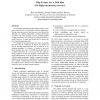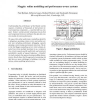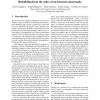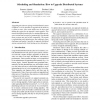HOTOS
2003
IEEE
15 years 7 months ago
2003
IEEE
Event-based programming has been highly touted in recent years as the best way to write highly concurrent applications. Having worked on several of these systems, we now believe t...
117
click to vote
HOTOS
2003
IEEE
15 years 7 months ago
2003
IEEE
Understanding the performance of distributed systems requires correlation of thousands of interactions between numerous components — a task best left to a computer. Today’s sy...
84
Voted
HOTOS
2003
IEEE
15 years 7 months ago
2003
IEEE
119
click to vote
HOTOS
2003
IEEE
15 years 7 months ago
2003
IEEE
Trusted computing (e.g. TCPA and Microsoft’s NextGeneration Secure Computing Base) has been one of the most talked about and least understood technologies in the computing commu...
107
click to vote
HOTOS
2003
IEEE
15 years 7 months ago
2003
IEEE
Upgrading the software of long-lived distributed systems is difficult. It is not possible to upgrade all the nodes in a system at once, since some nodes may be down and halting t...
HOTOS
2003
IEEE
15 years 7 months ago
2003
IEEE
The emergence of the global Internet has dramatically broadened and changed the computing landscape. In particular, much of the value in contemporary computing systems derives fro...
100
click to vote
HOTOS
2003
IEEE
15 years 7 months ago
2003
IEEE
User applications that move a lot of data across the user-kernel boundary suffer from a serious performance penalty. We provide a framework, Compound System Calls (CoSy), to enhan...
113
click to vote
CLUSTER
2003
IEEE
15 years 7 months ago
2003
IEEE
In this paper, we compare running the Linux operating system on the compute nodes of ASCI Red hardware to running a specialized, highly-optimized lightweight kernel (LWK) operatin...
NOSSDAV
2004
Springer
15 years 7 months ago
2004
Springer
113
click to vote
NOSSDAV
2004
Springer
15 years 7 months ago
2004
Springer
— We present the design, implementation, and performance evaluation of AMPS — a flexible, scalable proxy testbed that supports a wide and extensible set of next-generation pro...





